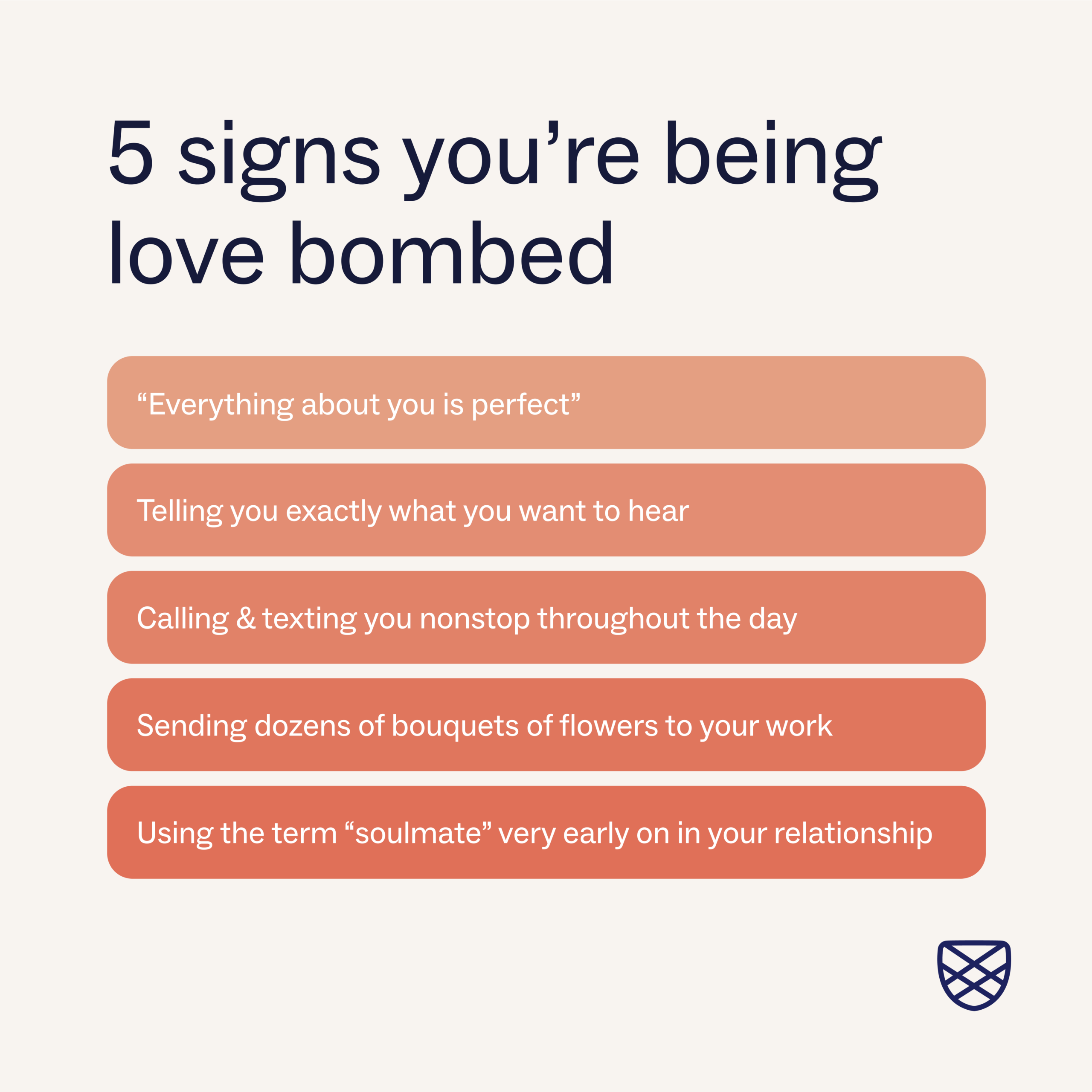
Table of Contents
What is Love Bombing?

Written By: Dr. Rasna Kaur Neelam

Clinically Reviewed By: Dr. Don Gasparini
February 14, 2023
7 min.
Love bombing describes grandiose acts of affection, especially early on in a relationship or after a large fight. Despite it seeming like a sweet gesture, love bombing may be a sign of underlying abuse.
Learn more about our Clinical Review Process
Table of Contents
What is the definition of love bombing?
Love bombing is the process by which a person “bombs,” or overwhelms, a new partner with grand gestures, praise, or affection to gain the upper hand in a relationship. Originally coined by the Unification Church of the United States, the phrase “love bombing” described the method through which church members would feign friendship or interest in people in order to successfully induct new recruits. Today, the term encompasses a wide variety of meanings in pop culture and on social media and has been tied by researchers to narcissism and even abuse.

Signs of love bombing
As mentioned above, love bombing is believed to be an excess of communication or other actions early in a new relationship in order to obtain passive power or control over the other individual’s life.
Although there is no one clear definition of what these actions entail, some examples of love bombing may include:
Excessive praise
Praise, affection, and compliments are all positive attributes of a new relationship. In love bombing, a person may overwhelm their partner with flattery, saying phrases like “You are my soulmate.” or “I never have met anyone else as amazing as you” to the point where the person on the receiving end may feel overwhelmed, uncomfortable, and unsure of how to respond.
Excessive “together” time
Spending quality time is a good thing. But in excess, spending too much time with a new partner can be a way for one partner to control the other and limit their contact with friends and family.
Excessive gift giving
Showering a partner with gifts can make the gift recipient feel that their partner has a lot of money or that they owe their partner something in return. Additionally, in pop culture, a wealthy romantic lead showering their partner with gifts may be symbolic of romance or love.
If you feel that you are being love bombed, pay attention to how your partner makes you feel.
- Do you feel that their behaviors are welcomed or do they make you feel uncomfortable and unsure?
- Do you feel that you continue to have the same autonomy over your life, actions, and social circles that you had before meeting your partner?
- Do you feel as though you still have your sense of self?
These are all questions that may help you better understand how this new relationship makes you feel.
Join the Charlie Health Library
Get mental health updates, research, insights, and resources directly to your inbox.
You can unsubscribe anytime.
Why might someone love bomb a partner?
Love bombing may be done intentionally or unintentionally.
In a 2016 study completed on millennial adults ages 18-30, 484 participants were asked to fill out surveys to better understand the attributes of individuals who are love bombers. The results showed that love bombing was associated with and could be caused by the following reasons:
- The individual is narcissistic
- The person has an avoidant attachment style.
- The individual has an anxious attachment style.
- The love bomber has low-self esteem, regardless of their attachment style.
More research is needed to fully understand and delineate these causes further.
Love bombing and narcissism
Individuals who have narcissistic tendencies can be more prone to love bombing. When the narcissistic tendencies are so severe that they interfere with the individual’s life, it is called narcissistic personality disorder (NPD).
According to the Diagnostic and Statistical Manual of Mental Disorders (DSM-V), NPD is defined as “a pervasive pattern of grandiosity (in fantasy or behavior), need for admiration, and a lack of empathy, beginning by early adulthood and present in a variety of contexts."
To be diagnosed with NPD, an individual needs at least five of the below criteria:
- Has inflated self-importance, feels superior to others, and often embellishes their talents or achievements
- Fantasizes about power, success, or beauty
- Feels that they are one-of-a-kind and that only special or powerful people can understand them
- Needs constant adoration
- Feels entitled to special treatment
- Exploits and takes advantage of others for their own benefit
- Does not think about other people’s needs or emotions
- Gets jealous of other people and also thinks people are jealous of them
- Is arrogant and egotistical
There are two types of narcissists. Overt or grandiose narcissists are more obvious or even aggressive about their displays of narcissism. On the other hand, covert or vulnerable narcissists may be less obvious to others, are hypersensitive to criticism, compare themselves to others, and inwardly have feelings of grandiosity.
By understanding certain traits of a narcissist–for example, the need for constant adoration, willingness to exploit and take advantage of others, jealousy, and more–we can begin to understand why someone with narcissistic tendencies may love bomb. By overwhelming someone with love, attention, and gifts, narcissists desire to have that love reciprocated.
Love bombing and abuse
Abusive relationships can exist with or without love bombing. However, if you feel that you are being love bombed, it is important to critically take a step back and look at the rest of your relationship for signs of abuse to ensure you are not in an unhealthy situation.
Abuse does not mean physical abuse only. The six types of abuse described below allow one individual to gain power and control over another.
Physical abuse
According to data published by a CDC report in 2003, one in ten high school students at some point had been purposefully hit, slapped, or physically assaulted by a person they were in a romantic relationship with. Signs of physical abuse may include hitting, choking, locking you out of your house or car, abandoning you in dangerous places, preventing you from eating or sleeping, and more. While physical abuse may be easy to recognize, we understand that these situations can be scary and dangerous to get out of.

Sexual abuse
Sexual abuse involves forcing a partner to engage in sexual acts to which they do not consent. Affirmative consent is required for any sexual activity. Sexual abuse also includes giving drugs or alcohol before sex, sharing messages or photos against a partner's wishes or without the partner knowing, stopping a partner from using forms of birth control, or even withholding sex as a form of control.
Stalking
Stalking is unwanted attention by a current or former partner that is intimidating and makes the victim question their safety. Many methods of stalking occur including sending unwanted communication, following, tracking, or threatening to damage property.
Digital abuse
Emotional abuse performed online can be described as digital abuse. This can include sending threatening messages, using technology to track a partner, determining who someone can and can’t be friends with on social media, pressuring someone to send explicit photos, and more.
Financial abuse
Preventing someone from being financially independent or having money is a way in which an abuser can control their victim. Examples of financial abuse include preventing someone from having a job, stealing money, making the victim ask for money, or downplaying financial contributions.
Psychological abuse
This involves verbal or non-verbal communication with the intended purpose of controlling a partner. Signs of psychological abuse include insulting or putting a partner down, isolating a partner from their friends, attacking a partner’s vulnerabilities, and more.
Another component of psychological abuse involves creating a sense of dependency by which the abuser tells the victim that they cannot live without them or threatens to do something drastic if they leave. With love bombing, a sense of dependency is also desired from the abuser. By showering the victim with attention, they hope the victim feels compelled to stay or is trapped in the relationship.
In addition to psychological abuse, individuals who love bomb may use many of the above abusive tactics but try to put a positive spin on them: for example, memorizing an individual’s schedule and following them as a sign of “love,” pressuring an individual to share passwords under the guise of “closeness,” or not allowing someone to make or use money because they shower them with expensive gifts.
Do you need more support with
your mental health?
Charlie Health can help.
Therapy can help all parties
If you feel that you are on the receiving end of love bombing or are experiencing discomfort in your relationship, therapy can help in numerous ways. These include:
- Helping you distinguish attributes of healthy vs unhealthy relationships
- Understanding and recognizing patterns of abuse in a partner
- Understanding and recognizing narcissistic tendencies in a partner
- Setting healthy boundaries for yourself
- Regaining your self of self and autonomy after leaving an unhealthy relationship
In addition to the individual on the receiving end of love bombing, help is also available for those who participate in the love bombing on the active side. It is common for someone with narcissistic personality disorder or low self-esteem, for example, to also suffer from depression, bipolar disorder, substance use, and anxiety. We understand that it may be difficult for a narcissist to want to seek help. But intense emotions, troubled relationships, low self-esteem, and other mental health disorders may push a narcissistic person to want treatment. In these cases, a combination of therapy and medication when necessary is typically utilized in this individualized approach.
If you or someone you love is in an abusive relationship or experiencing domestic violence, you can reach the National Domestic Violence Hotline 24/7 at 800-799-7233.
Mental health support at Charlie Health
At Charlie Health, every client is matched with a therapist who fits their specific needs. Additionally, each individual will also be matched with a group of peers who are from similar backgrounds with similar struggles





